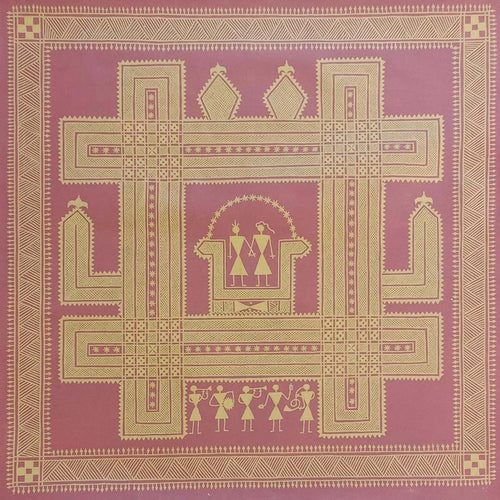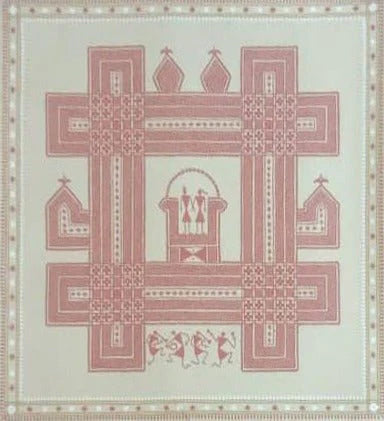
About
Chittara art is a traditional form of painting from the Deevaru community in the Sagara region of Karnataka, India. Known for its intricate geometric patterns and vibrant designs, Chittara art is deeply rooted in the local culture and traditions. These paintings are often created on the walls of homes during festivals, weddings, and other auspicious occasions, symbolizing prosperity, protection, and blessings for the household. Chittara art is characterized by its use of natural colors and a focus on symmetry and precision, making it a unique representation of the artistic heritage of Karnataka.
History
The origins of Chittara art can be traced back centuries, with the Deevaru community passing down this art form through generations. Traditionally, Chittara paintings were made by women in the community as a part of their domestic ritual practices. These artworks served not only as decoration but also as a means of communicating cultural values, beliefs, and stories of their ancestors. The art form was closely tied to the agricultural calendar, with specific motifs representing fertility, rain, and good harvests. Despite modern influences, Chittara has managed to retain its traditional essence, thanks to the dedication of the Deevaru community to preserving their ancestral art.
Chittara art revolves around themes of nature, daily life, and the spiritual beliefs of the Deevaru community. Common motifs include birds, animals, plants, and symbols representing the sun, moon, and stars. These elements are often arranged in intricate geometric patterns that reflect the order and harmony of the natural world. The artwork also depicts scenes of community life, including farming, festivals, and rituals, providing a visual narrative of the Deevaru’s way of life. Each motif in Chittara art holds symbolic meaning, often connected to prosperity, fertility, protection, and the divine.
Materials and Methods
Chittara art is created using entirely natural materials, reflecting the Deevaru community’s close connection with the environment. The base for the paintings is usually a mixture of red soil and cow dung, which is applied to the surface as a foundation. Natural colors are then used to create the designs: white is made from rice paste, red from laterite soil, black from charcoal, and yellow from turmeric. The brushes are made from the sticks of the Areca nut tree, split at the ends to create a fine tip. Artists use these tools to draw intricate patterns with precision, guided by years of practice and a deep understanding of traditional motifs.
Significance
Chittara art holds significant cultural and spiritual value within the Deevaru community. It is more than just an art form; it is a medium through which cultural heritage, beliefs, and values are expressed and preserved. The paintings are often created during important life events and festivals, serving as symbols of blessing, protection, and celebration. Chittara art also plays a role in strengthening community bonds, as women gather to create these works together, passing down their skills and knowledge to the younger generations. In recent years, there has been a renewed interest in Chittara art, with efforts to promote and preserve it through exhibitions, workshops, and collaborations with contemporary artists. This recognition not only helps sustain the art form but also empowers the Deevaru community by providing them with opportunities to share their cultural heritage with the world.
FAQs
Are the colors used in Chittara artwork safe and non-toxic?
Yes, the colors used in Chittara artwork are entirely natural and non-toxic, made from eco-friendly sources like plant-based dyes, rice paste, and natural minerals.
Can Chittara artwork be used as home decor?
Absolutely! Chittara art is perfect for home decor, adding a touch of traditional Indian heritage to any room. The geometric designs and natural hues complement various styles of interior decor.
What sizes of Chittara artwork are available?
Chittara artwork comes in various sizes, from small pieces suitable for tabletops or walls to larger murals. You can choose from our range or request a custom size to suit your space.




